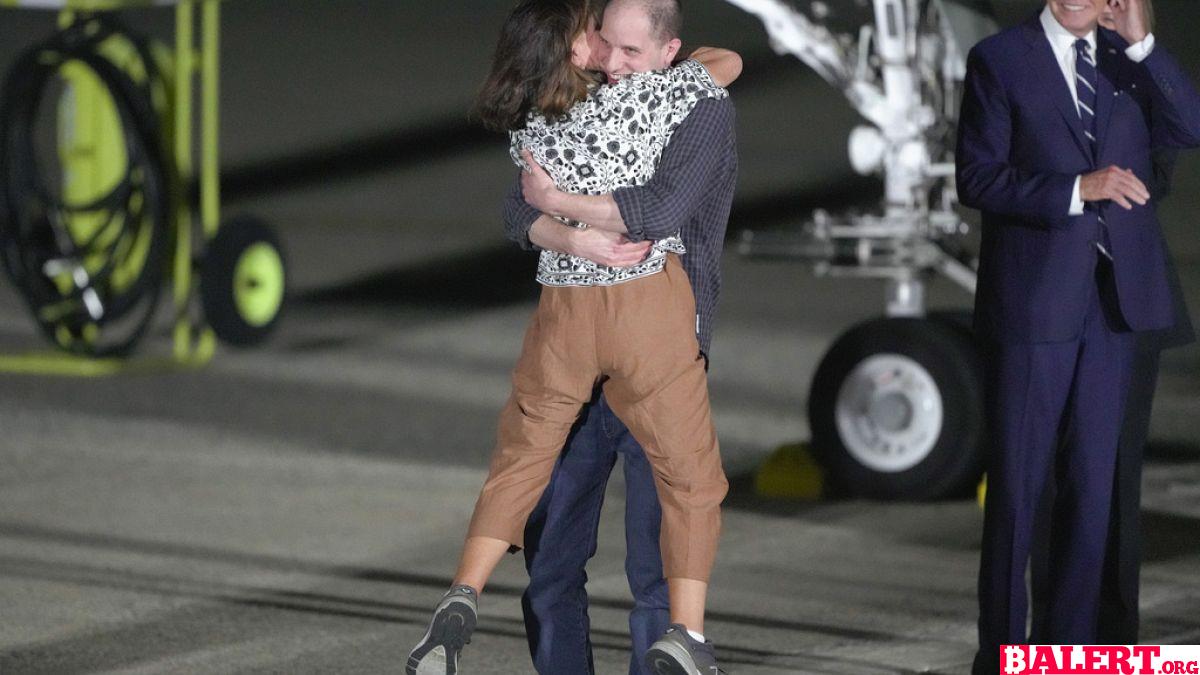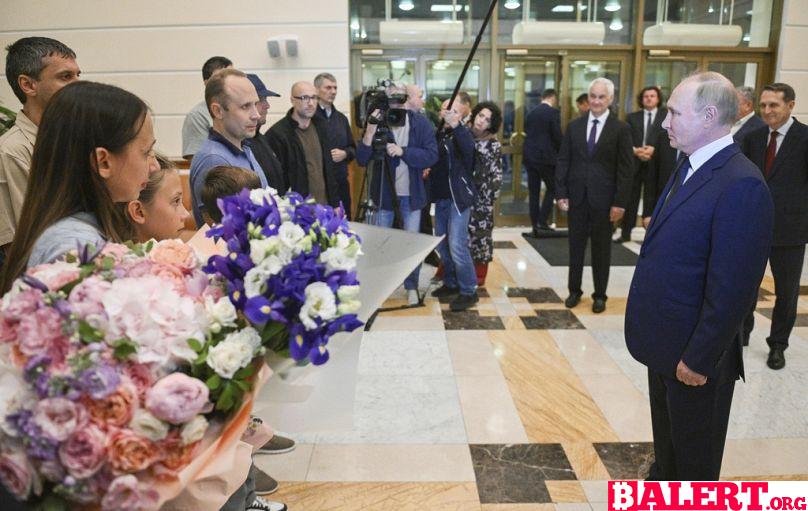World
Historic US-Russia Prisoner Exchange: Key Figures and Implications
Explore the significant US-Russia prisoner exchange, highlighting key figures involved and the broader implications for international relations. Discover how this event shapes diplomatic ties between the two nations and its impact on global security.

Historic Prisoner Exchange Between the United States and Russia

The United States and Russia recently executed their most significant prisoner exchange since the dissolution of the Soviet Union. In a remarkable move, Moscow released journalist Evan Gershkovich, fellow American Paul Whelan, and a number of prominent dissidents, including the notable Vladimir Kara-Murza. This multinational agreement ultimately secured the freedom of a total of 24 individuals.
Gershkovich, Whelan, and Alsu Kurmasheva, a journalist holding dual US-Russian citizenship, arrived back in the United States just before midnight. Their emotional reunion with family members took place at Joint Base Andrews in Maryland, where they were warmly welcomed by President Joe Biden and Vice President Kamala Harris, who greeted them with heartfelt hugs on the tarmac.
This intricate swap unfolded against a backdrop of severely strained relations between Washington, D.C., and Moscow, which have deteriorated further due to Russian President Vladimir Putin‘s full-scale invasion of Ukraine that began in February 2022.
During behind-the-scenes negotiations, there were discussions about potentially including Russian opposition leader Alexei Navalny in the exchange. However, following his death in February, the negotiators shifted their focus to finalize a new agreement involving 24 individuals. This agreement necessitated significant concessions from European allies, including the release of a Russian assassin, to facilitate the freedom of various journalists, suspected spies, political prisoners, and others.
President Biden characterized the exchange, the largest in a series of swaps with Russia, as a diplomatic triumph. He also welcomed the families of the returning Americans to the White House, emphasizing the importance of their safe return. However, the deal highlighted a notable imbalance: the United States and its allies were compelled to release Russians charged or convicted of serious crimes in exchange for the freedom of journalists, dissidents, and others who were imprisoned on what the West views as politically motivated charges.
“Deals like this one come with tough calls,” Biden remarked. “There’s nothing that matters more to me than protecting Americans at home and abroad.”
The agreement saw Russia release Gershkovich, a Wall Street Journal reporter who had been jailed in 2023 on espionage charges, which both he and the US government continue to deny. Also included in the exchange was Whelan, a corporate security executive from Michigan who has been detained since 2018 on espionage charges that he and Washington vehemently reject. Kurmasheva, a journalist for Radio Free Europe/Radio Liberty, was also released; she had been convicted of disseminating false information about the Russian military—an accusation her family and employer firmly contest.
The released dissidents included Kara-Murza, a vocal critic of the Kremlin and Pulitzer Prize-winning writer, who was serving a 25-year sentence on charges of treason widely perceived as politically motivated. Among those released were several associates of Navalny, including Oleg Orlov, a seasoned human rights activist, and Ilya Yashin, who was imprisoned for speaking out against the war in Ukraine.
In return, Russia received Vadim Krasikov, who had been convicted in Germany in 2021 for the murder of a former Chechen rebel in Berlin, reportedly on the orders of Moscow’s security services. Following Navalny’s death, officials intensified efforts to secure Krasikov’s release, ultimately persuading Germany to agree to the swap. Additionally, Russia gained custody of two alleged sleeper agents who had been detained in Slovenia, along with three men charged in the United States, including Roman Seleznev, a convicted hacker, and Vadim Konoshchenok, accused of supplying US-made electronics and ammunition to the Russian military.
Notably, Norway and Poland also participated by releasing individuals who had been detained on espionage charges. “Today is a powerful example of why it’s vital to have friends in this world,” Biden stated, underscoring the collaborative effort involved in the exchange.
In total, six countries were involved in the release of prisoners, with the swap taking place in Ankara, Turkey. President Biden has consistently emphasized the importance of securing the release of wrongfully detained Americans as a key aspect of his foreign policy agenda. In an Oval Office address announcing his decision not to seek a second term, he reiterated this commitment, highlighting the administration’s efforts to bring home over 70 Americans through various negotiations.
Despite the Biden administration’s attempts to bring home detained Americans, there has been criticism regarding the potential for these actions to set a precedent that could encourage future hostage-taking. However, Roger Carstens, the US government’s chief hostage negotiator, defended the agreements, asserting that the number of wrongfully detained Americans has actually decreased.
Thursday’s swap eclipsed a previous significant exchange in 2010, which involved 14 individuals. In that instance, Washington released 10 Russians living in the US as sleeper agents, while Moscow freed four Russians, including Sergei Skripal, who was subsequently poisoned in Britain in 2018 in an attack attributed to Russian agents.

World
Dominique Pelicot Testifies in Harrowing Rape Trial
Join us as Dominique Pelicot courageously testifies in a harrowing rape trial, shedding light on the complexities of trauma and justice. Her powerful story raises crucial questions about the legal system and the importance of support for survivors.

Dominique Pelicot Takes the Stand in Shocking Rape Trial
In a courtroom drama that has captivated France and garnered international attention, Dominique Pelicot, the man at the center of a harrowing rape trial, finally addressed the court. With tears streaming down his face, he recounted how his wife had been instrumental in helping him cope with a tumultuous past marked by trauma. He revealed that he had endured a sexual assault at the tender age of nine while hospitalized, and he also witnessed a gang rape during his teenage years while working as an apprentice electrician on a construction site.
“She didn’t deserve this, I acknowledge that,” Mr. Pelicot stated, his voice barely audible as he struggled to convey his emotions. The gravity of the situation weighed heavily on him, and the courtroom fell silent, straining to catch his every word.
Now 71 years old, Mr. Pelicot faces serious allegations of drugging his wife, Gisèle Pelicot, whom he has been married to for half a century, over a span of nearly ten years. Prosecutors contend that he used drugs to render her comatose, allowing him to rape her repeatedly. Furthermore, authorities allege that he went so far as to invite numerous men into their home, facilitating a nightmarish scenario where they, too, engaged in the assault of his wife.
Overall, 51 men, including Mr. Pelicot, are on trial concurrently, primarily facing charges related to the aggravated rape of Ms. Pelicot. Among them, one individual has already pleaded guilty to similar crimes, admitting to drugging his own wife to assault her and inviting Mr. Pelicot to partake in the horrific act while she was incapacitated.
Mr. Pelicot’s unexpected testimony came after a tumultuous start to the trial. Just a week in, he was stricken with severe health issues that forced him to miss four consecutive days in court. The head judge ultimately decided to postpone proceedings, as Mr. Pelicot was diagnosed with kidney stones, a kidney infection, and prostate complications, adding yet another layer of complexity to this already harrowing case.
World
Meta Bans Russian State Media Outlets from Social Media Platforms
Explore the implications of Meta’s decision to ban Russian state media outlets from its social media platforms. Understand the impact on information dissemination and the ongoing battle against misinformation in the digital landscape.

Meta Imposes Global Ban on Russian State Media Outlets
In a significant move, Meta Platforms, Inc., the parent company of Facebook, has announced the prohibition of Russian state media outlets, including RT (Russia Today) and Rossiya Segodnya, from all its social media platforms. The decision stems from the company’s concerns regarding the deceptive strategies employed by these media organizations to execute covert influence operations across the internet.
Meta made this announcement on Monday, emphasizing that the ban will be enforced worldwide across its various platforms, such as Instagram, WhatsApp, and Threads. The rollout of this ban is expected to take place over the coming days.
Statement from Meta
A spokesperson for Meta elaborated on the decision, stating, “After careful consideration, we have expanded our ongoing enforcement actions against Russian state media outlets. As a result, Rossiya Segodnya, RT, and other affiliated entities are now banned from our applications globally due to their involvement in foreign interference activities.”
For further insights into this development, watch the video in the player above.
World
Trump Recalls Alleged Assassination Attempt While Golfing
Explore Donald Trump’s chilling recollection of an alleged assassination attempt he experienced while enjoying a round of golf. Delve into the tense moments and his reflections on safety, fame, and the unpredictability of public life.

In a recent interview on the social media platform X, Republican presidential nominee Donald Trump recounted a harrowing incident he claims to have experienced while playing golf. Trump described how, during a peaceful Sunday morning round with friends, the tranquility of the day was abruptly shattered by the sound of gunfire in the air.
“It was a beautiful day, everything was just perfect,” Trump reflected. “Then all of a sudden, we heard shots being fired—probably around four or five in total.” He went on to explain that a Secret Service agent was the first to spot the suspect, who was allegedly armed with an AK-47, a powerful assault rifle.
“The agent saw the barrel of the weapon and immediately took action, returning fire at the barrel and aiming in the direction of the bushes,” Trump detailed. “I would have loved to have sunk that last putt, but we decided it was best to leave the scene promptly.”
Trump expressed his gratitude towards the agents and a vigilant civilian who aided in tracking down the suspect, who was eventually apprehended following a high-speed chase.
Suspect Faces Multiple Federal Gun Charges
The FBI has identified the suspect as Ryan Wesley Routh, accusing him of targeting Trump during his time at the golf club in West Palm Beach, Florida. According to an FBI report, Routh had allegedly hidden among the hedges of the golf course for an astonishing 12 hours. Authorities discovered an SKS-style assault rifle, a GoPro camera, and a bag of food at the scene.
The 58-year-old Routh is now facing two serious federal gun charges. If convicted on both counts, he could face a combined maximum sentence of 20 years in prison. Notably, neither of the charges is directly related to an assassination attempt. The first charge pertains to possessing a firearm despite a prior felony conviction, which carries a potential 15-year sentence, a fine of $250,000 (€225,000), and three years of supervised release.
The second charge involves possession of a firearm with an obliterated serial number, which could result in a five-year prison term, the same financial penalties, and also three years of supervised release. As the investigation continues, additional charges could be forthcoming.
While the motive behind Routh’s actions remains unclear, his digital footprint reveals strong political affiliations, particularly concerning issues surrounding Ukraine and China. Routh consistently expressed support for Ukraine across various social media platforms, even claiming to have orchestrated a recruitment scheme for international volunteers aiming to assist Ukraine in its fight against Russia’s invasion. This behavior has been denounced by Ukrainian soldiers and members of the International Legion, who disavowed Routh’s actions and motives.
-

 Business5 months ago
Business5 months agoThe Significance of Jackson Hole: A Central Banking Tradition
-

 Tech4 months ago
Tech4 months agoNew Leaks and Features About the Samsung Galaxy S25 Ultra
-

 Business7 months ago
Business7 months agoObituary: Dan Collins
-

 Article7 months ago
Article7 months agoCreative Design Applications Developed with Artificial Intelligence
-

 Business4 months ago
Business4 months agoBhutan’s Strategic Investment in Bitcoin: A New Era for the Himalayan Kingdom
-

 World4 months ago
World4 months agoThierry Breton Resigns: Impact on European Union Leadership
-

 Gaming4 months ago
Gaming4 months agoNew Details and Trailer Released for Dead Rising Deluxe Remaster
-

 Gaming4 months ago
Gaming4 months agoNew Details for Alan Wake 2 and PlayStation 5 Pro Announcement












